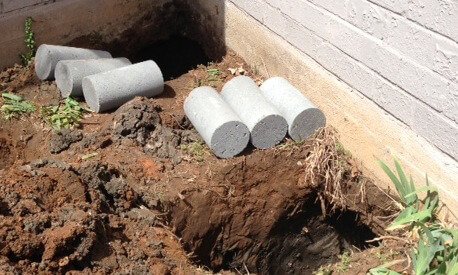If you see bowed walls, experience a wet basement, or view cracks in your foundation, then you have an urgent problem. Ignoring it is not the answer because it will get worse. Your home’s foundation is essential as it holds up the rest of your home, but you need to choose with the help of a professional which type of foundation repair will work best for you.
Steel Piers
If your home is starting to settle, you may need steel piers installed. Steel is incredibly strong and long-lasting. In fact, you will probably not have to worry about your house’s foundation again, as fixing your foundation with steel piers typically lasts about 150 years.
Concrete Piers
If your foundation is settling unevenly, then concrete piers can be a great solution as they are customized to your home. Since there is a lot of manual labor involved, it can get expensive, but this solution will last a very long time.
Helical Piers
When you start to investigate foundation repair, you may read a lot of hype about helical piers. While they can be an excellent solution for homes built on clay soil, this solution has not been proven long-term to be more effective than using steel alone in most circumstances.
High-density Polyurethane Foam
High-density polyurethane foam is ideal for emergency foundation repairs because of its ability to rise quickly to fill in gaps. While it is often not a long-term solution, it can buy you the time you need in case you are having trouble paying for more expensive solutions.
Segmented Piers
Segmented piers are small cylindrical tubes pressed into the soil to stabilize your home’s foundation. Since workers in a factory make these piers, they can be a cost-effective method of repairing your house’s foundation.
Spot Piers
Spot piers are a solution worth considering if only part of your home’s foundation is giving you issues. For instance, experts often recommend them to fix foundations where a patio fastens onto the main part of the home or if a small storage area was added to your home after workers constructed the main house.
Masonry Patches and Sealants
If you are looking for options for repairing your foundation, you need to consider masonry patches and sealants. Often called vinyl concrete patches, they can be a great solution for fixing minor issues that may become larger if corrective measures are not done.
Slab Jacking
Slap jacking can be the perfect answer if the foundation is in good shape but is sinking in places. Instead of repairing the foundation, workers drill small holes under the foundation. Then, they fill the holes with a mixture of grout and foam, forcing the foundation to rise within a couple of hours. Your home’s foundation holds up your home, so do not ignore foundation issues as they will become more costly and complicated to fix. Instead, homeowners from Georgia to Maryland should contact 58 Foundations. Since 1958, they have been helping people fix their foundation issues.








